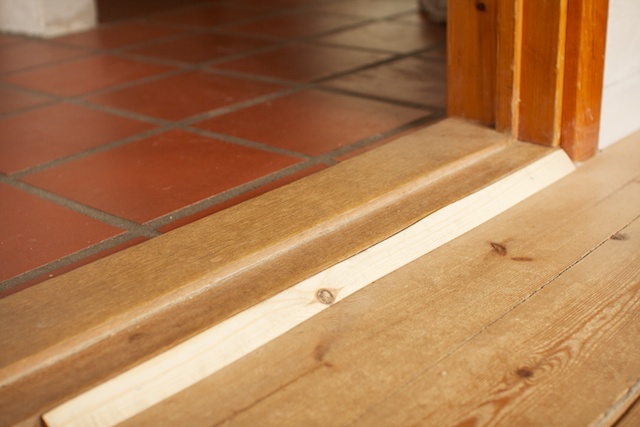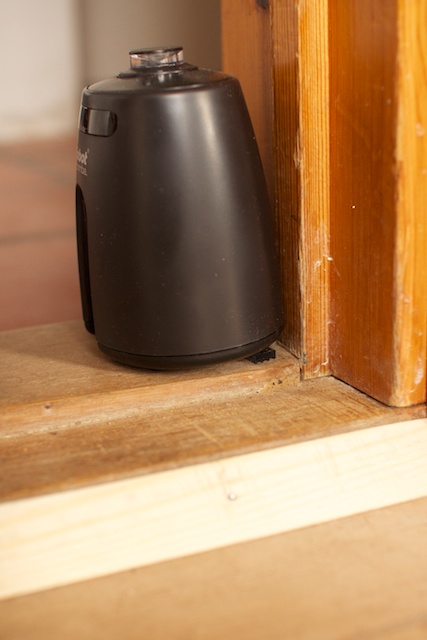Making a roomba negotiate a doorsill
Having just become a Roomba owner, I was faced with the challenge of wanting the robot to negotiate a slightly large doorsill in a narrow doorway, as the robot should move form the livingroom to adjacent rooms. The manual says that you should lave at least 1 meter of open space from the front of the lighthouse - but this is difficult when the doorway itself is less than one meter. Second, the doorsill is a two-step construction with a 2cm climb followed a few centimeters later by a 1cm climb.
By default, the roomba could not reliably pass the sill. It frequently got stuck on the 2cm climb, and it bumped into the side of the door frame opposing the lighthouse.
Solution 1: Smooth the climb
 To allow the robot to better negotiate the 2cm climb, smoothed it out a bit
with a ramp. This is a proof of concept - I will make one that fits better and
hopefully matches the colour of the floor or sill, but I needed a prototype
quickly.
To allow the robot to better negotiate the 2cm climb, smoothed it out a bit
with a ramp. This is a proof of concept - I will make one that fits better and
hopefully matches the colour of the floor or sill, but I needed a prototype
quickly.
Solution 2: Traverse closer to lighthouse
 The robot cannot measure its distance to the
lighthouse as such (it has no laser based range finder, sonar or other means of
establishing distance aside from bumping into things or sensing "large objects
approaching"), so how does it decide which distance to keep to the lighthouse?
I could not find any documentation on this, so my best guess was that the
lighthouse is projecting an infrared beam from the top, at a downward angle
towards the opposing side of the door frame. The robot will then approach when
the beam has the right height, relative to the floor space of the robot. See,
this even worsens my problem - not only is the door frame too narrow already,
the lighthouse sits elevated on the doorsill while the robot is 3 cm below on
the floor, and will therefore traverse the doorsill even further away from the
lighthouse (since the lighthouse is elevated, the robot needs more distance to
the lighthouse for the infrared beam to reach the right height). The simple
solution is to glue two rubber spacers on the two back feet of the lighthouse, so that
it is tilted slightly forwards. This changes the angle of the infrared beam, and the robot
will find the right height of the beam closer to the lighthouse. I have no confirmation
that my theory behind this holds, but the solution works like a charm.
The robot cannot measure its distance to the
lighthouse as such (it has no laser based range finder, sonar or other means of
establishing distance aside from bumping into things or sensing "large objects
approaching"), so how does it decide which distance to keep to the lighthouse?
I could not find any documentation on this, so my best guess was that the
lighthouse is projecting an infrared beam from the top, at a downward angle
towards the opposing side of the door frame. The robot will then approach when
the beam has the right height, relative to the floor space of the robot. See,
this even worsens my problem - not only is the door frame too narrow already,
the lighthouse sits elevated on the doorsill while the robot is 3 cm below on
the floor, and will therefore traverse the doorsill even further away from the
lighthouse (since the lighthouse is elevated, the robot needs more distance to
the lighthouse for the infrared beam to reach the right height). The simple
solution is to glue two rubber spacers on the two back feet of the lighthouse, so that
it is tilted slightly forwards. This changes the angle of the infrared beam, and the robot
will find the right height of the beam closer to the lighthouse. I have no confirmation
that my theory behind this holds, but the solution works like a charm.